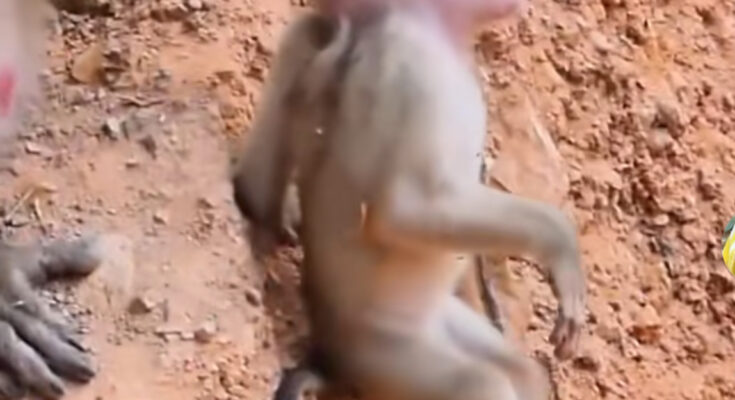In the quiet canopy of a Southeast Asian forest, a heart-wrenching scene unfolded—a baby monkey, barely a few months old, was found injured and frightened, hiding beneath the roots of a large tree. Witnesses say it had been bitten and violently abused by an older monkey from its own troop.
This disturbing incident has left wildlife watchers and rescuers shocked, but it also highlights a lesser-known truth about primate social behavior: like humans, monkeys can be both nurturing and cruel.
The Harsh Reality of Monkey Troops
Monkeys live in social groups called troops, often governed by strict hierarchies. Adult males compete for dominance, and females protect their young with fierce devotion. But in some cases, social tensions, competition for resources, or territorial disputes can lead to aggressive behavior—sometimes even toward the troop’s own young.
In this case, the baby monkey, believed to be a long-tailed macaque, was targeted by a dominant adult male. Rescuers speculate that the infant may have belonged to a rival female or that the adult male was attempting to assert dominance. Whatever the reason, the result was tragic: deep bite wounds on the baby’s neck and back, signs of trauma, and a fear-stricken expression no infant should ever wear.
A Race Against Time
Local wildlife volunteers were alerted by nearby villagers who witnessed the attack. The rescuers arrived to find the baby monkey alone, weak, and in pain. The adult monkeys had moved on, leaving the infant behind. Swift action was crucial. The baby was gently captured and transported to a wildlife rehabilitation center for urgent care.
Veterinarians cleaned the wounds and began treatment for infection. The baby, now named “Lumo” by his caregivers, is slowly regaining strength—but the emotional scars may take longer to heal than the physical ones.
Understanding the Behavior
Though it may be difficult to watch, such events are not unheard of in the animal kingdom. Intra-species aggression is part of survival in the wild. Experts emphasize that while it’s heartbreaking, it’s also natural behavior driven by instincts.
However, human expansion and encroachment on monkey habitats have been making troop dynamics more unstable. As resources dwindle, competition within troops can intensify, often leading to aggression that might otherwise not occur.
A Call for Compassion
Lumo’s story serves as a reminder of the complex and sometimes cruel world animals live in—especially as human activity disturbs their ecosystems. It also shows the importance of wildlife rescue and education. With ongoing care, Lumo is expected to recover fully and may one day be reintroduced into a safer environment.
As observers, we cannot always interfere in nature—but we can support the organizations that help animals in distress. Lumo may have suffered early in life, but with help and compassion, his future now looks brighter.



